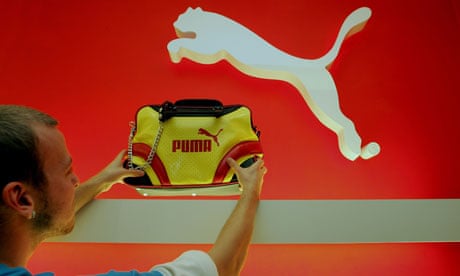Puma has become the first company in the world to put a value on the eco services it uses to produce its sports shoes and clothes, signalling a radical change in the way business will account for its use of natural resources.
Puma has published an economic valuation of the environmental impacts caused by greenhouse gas emissions (GHGs) and water consumption along its entire supply chain and has committed to the more difficult task of integrating both its social and economic impacts.
The company and its parent group PPR, which owns luxury brands ranging from Gucci to Stella McCartney, made it clear that the current system is responsible for degrading the planet's eco-systems and irresponsibly depleting natural resources and needed to go through fundamental change.
It said: "Puma and PPR Home will look to play a catalytic role in raising awareness that the current business model is outdated and needs decisive reforms, forging partnerships and collaborations to explore new and innovative ways to differentially attribute the responsibilities and equitably share the costs of these, while building capacity at suppliers' factories and developing new materials and products."
Puma has made a commitment that within four years, half its international collections will be manufactured according to its internal sustainability standard, by using more sustainable materials such as recycled polyester, as well as ensuring its suppliers develop more sustainable materials and products.
Veteran environmental campaigners and experts on biodiversity welcomed the groundbreaking initiative and said that other companies would now be under pressure to follow Puma's lead.
John Elkington, who developed the idea of triple-bottom line accounting, which takes into account people, planet and economic impacts, rather than just shareholders, said: "This sort of accounting was pretty much what I had in mind when I came up with the triple bottom line 17 years ago. We've taken a while to get there, but the pace is accelerating.
"In the sports and apparel sectors, Nike and Gap pioneered in making their supply chains more transparent, but Puma has jumped well ahead of its competitors with this initiative.
"Let's hope they trigger the competitive instincts of CEOs well outside their sector – spurring a race to radical transparency."
Puma's creation of an environmental profit and loss account shows that while the direct ecological impact of its operations equates to £6.2m, an additional £74.7m falls upon its entire supply chain.
The company said the new accounting system would prepare it for potential future disclosure requirements. So as not to scare investors, it insists that the new broader measure of its impacts will not affect its net earnings.
Jochen Zeitz, chairman and CEO of Puma and chief sustainability officer at PPR, said: "The E P&L statement is an essential tool and a shift in how companies can and should account for and, ultimately, integrate into business models the true costs of their reliance on ecosystem services and PPR Home will encourage and collaborate with the industry to adopt this tool.
"Gaining a better understanding of the source of the natural goods and services Puma relies on and the declining availability of the basic resources required for our business growth, will help Puma build a more resilient and sustainable business model and ultimately better manage its impacts on the environment."
The methodology for the new P&L was developed by PwC and Trucost, based on a value per tonne of CO2 at £57 and an average water value of £0.69 per m3.
The analysis involved looking at all impacts ranging from raw material production, such as cotton farming and oil drilling, to processing, involving leather tanneries, the chemical industry and oil refining.
The biggest impact was found at the point where raw materials are derived from natural resources, such as the cultivation and harvesting of cotton and cattle ranching. This part of the supply chain accounts for 35% of the total GHG (£14.3m) and 43% of water consumption (£21.2m); indicating that the most water intensive activity in the production of a t-shirt occurs at the initial step.
The next stage in developing a triple bottom line accounting system will take place this autumn, when Puma includes additional environmental key performance indicators such as acid rain and smog precursors, volatile organic compounds, waste and land use change.
Once this is complete, Puma will tackle the complexities of social factors in sustainability such as fair wages, safety and working conditions, enabling the development of an Environmental and Social P&L account.
The final step will be to value the social and economic benefits from Puma's operations through the creation of jobs, tax contributions, philanthropic initiatives and other value-adding elements. These benefits will then be offset against the environmental and social costs to complete the P&L statement.
The company has made a commitment to share the results of the E P&L with other industry players and corporations to help create a common standard.
This content is brought to you by Guardian Professional. Join the Sustainable Business Network for regular updates

Comments (…)
Sign in or create your Guardian account to join the discussion